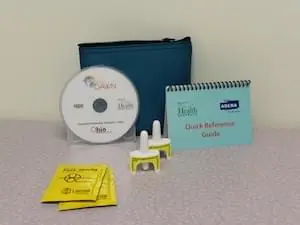Adena Now Sending Narcan Home with Overdose Patients

Adena Regional Medical Center’s Emergency Department is distributing a take-home kit that includes naloxone, commonly referred to as Narcan, to patients being treated for an opioid overdose.
This new naloxone distribution program is made possible through a supplemental grant that was awarded to the Ross County Health District from the Ohio Department of Health and the U.S. Centers for Disease Control and Prevention. The funds are intended to establish a Narcan ER Program. Adena’s ER is now distributing the free naloxone kits to consenting patients prior to discharge.
“This is another step forward by Adena to reduce the drug overdose death rates in our region,” said Dr. John Gabis, a primary care provider with Adena Family Medicine and chair of the Heroin Partnership Project (HPP). Gabis also serves as Ross County Coroner. “This program demonstrates Adena’s continued commitment to fight the epidemic of opioid overdose deaths. Naloxone distribution and the work of our Emergency Department’s Post Overdose Response Team are examples of Adena’s collaboration with our community and the HPP.”
In 2017, Adena’s Emergency Department treated 251 people who overdosed. Today’s patients will now have greater access to this life-saving tool.
Each Narcan kit includes two nasal dosage containers that can be administered to those experiencing an unintentional or intentional overdose. In many cases, Narcan will reverse the life-threatening effects of opioids. Educational materials are also included in the kit and include information related to the signs of an opioid overdose, how to respond to a suspected overdose, and community resources that are available to addicts and their loved ones.
“Evidence-based research shows that patients who overdose are more likely to overdose again,” Dr. Gabis added. “Saving a life affected by opioid use disorder starts with naloxone after an overdose. We want to be proactive in eliminating barriers that would normally prevent drug overdose patients and their family and friends from quick access to naloxone.”
Dr. Gabis noted, Narcan does not take the place of emergency medical care, and 911 should be called when it is used. “Current efforts throughout Ross County have already reduced the overdose death rate by 25 percent. By instituting a program such as this in our Emergency Department, we can help to further save those needing help until treatment.”
Adena’s Narcan distribution program comes on the heels of U.S. Surgeon General Dr. Jerome Adams’ recommendation that more Americans know how to use naloxone, and keep it within reach to save lives.